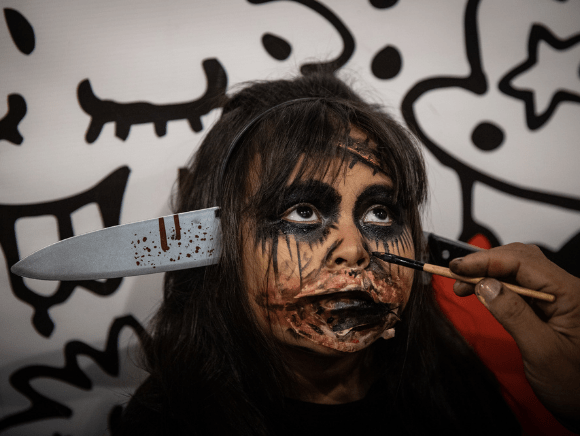It’s the spooky season, which also means it’s time for spooky politics. According to a YouGovAmerica survey of 1,000 adults, 23% said Halloween is one of their favorite holidays. Dressing up as ghouls, witches, and superheroes isn’t just for kids. But be careful; cancel culture has dipped its gnarly hands in this holiday as well, claiming some costumes discriminate against the disabled.
Suppose part of your costume consists of scars, fake limbs, prosthetic hooks, or blind walking sticks (such as a blind referee). Well, that is not okay, according to Marie Dagenais-Lewis, a disability rights activist with the Diversability Leadership Collective. She told Yahoo Life these types of costumes “really highlight the ableist society’s blatant disregard for disability” and “perpetuate the notion that disability should be feared.” She added that while dressing up should be fun, “it’s not fun for the disability community when we are constantly appropriated with negative connotations.”
 Hollywood is apparently to blame for casting villains with scars and other “scary” attributes. The U.K. charity Changing Faces said, “many children and adults can find Halloween difficult when they see their scars, marks or conditions being associated with negative characters and being labeled as ‘frightening.’” The nonprofit has launched the “I Am Not Your Villain” campaign against such Hollywood depictions and targeted specific productions including the latest James Bond movie, No Time to Die. Dagenais-Lewis said Tinseltown has to answer for stigmatizing disability. She continued:
Hollywood is apparently to blame for casting villains with scars and other “scary” attributes. The U.K. charity Changing Faces said, “many children and adults can find Halloween difficult when they see their scars, marks or conditions being associated with negative characters and being labeled as ‘frightening.’” The nonprofit has launched the “I Am Not Your Villain” campaign against such Hollywood depictions and targeted specific productions including the latest James Bond movie, No Time to Die. Dagenais-Lewis said Tinseltown has to answer for stigmatizing disability. She continued:
“These costumes feel like harmless fun but they engrain societal microaggressions and longstanding ableist misconceptions about the community. Not only do these costumes perpetuate the idea that disability and villainy go hand in hand per cinematic portrayal of this connection, but they serve to trivialize the traumas associated with disability. For many of the character subjects of these costumes, disability was acquired by way of a traumatic event. Rather than being a source of empathy and understanding, these costumes turn trauma into entertainment labeled as ‘horror.'”
Think Freddy Krueger in Nightmare on Elm Street, Jason Voorhees from Friday the 13th, or The Texas Chainsaw Massacre’s Leatherface as examples.
The idea is catching on. East Lansing Public Schools in Michigan announced earlier this month that it was canceling Halloween to be more “inclusive” and “equitable” to those who don’t participate in the festivities. In Seattle, WA, a school canceled its “Pumpkin Parade” because it supposedly marginalized people of color. And Michigan State University (MSU) sent an email to students telling them to be mindful of the costumes they choose this year. Within the missive was a link to an article explaining how to be sensitive when choosing Halloween costumes, according to the Daily Mail, which acquired the email. One portion explained:
“While most think of Halloween as a time to dress in costume and celebrate all things spooky, it also can become a breeding ground for racist, sexist, culturally insensitive and biased behaviors. Halloween can be an opportunity to creatively dress and decorate, but experts say it’s important to consider how costumes that portray specific groups of people in demeaning ways — as criminals, hyper-sexualized and or grotesque caricatures — can perpetuate harmful stereotypes.”
MSU’s director of health promotion, Dennis Martel, said, “Misrepresentation and acts to dehumanize others have long been a way for certain groups to exercise racial superiority.” The MSU email claims “costumes can elicit trauma if they poke fun at the experiences of historical harm, bigotry or displacement.” The university provided a list of costumes that could cause harm including a pandemic victim, black face, and a homeless person, to name a few.
Are we saying goodbye to creepy villains like Freddy Kruger for good now? Will all evil or negative characters and costumes have to show perfect complexions? No more one-legged pirates with parrots on their shoulders? Will a mummy wrapped in gauze elicit outrage? And what about the zombies? Times, they are a-changin’. What will next year’s Halloween see?
~ Read more from Kelli Ballard.




